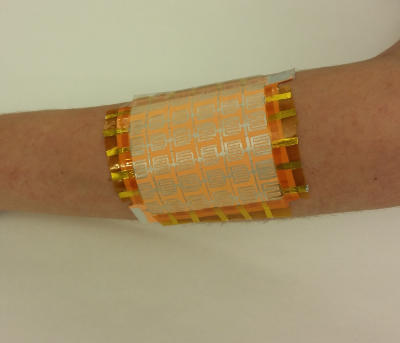Using AI to control energy for indoor agriculture
30 September 2024
Published online 7 March 2016
Scientists synthesize high-performance skin made from paper, tape and kitchen products.

© Joanna Nassar
Scientists at King Abdullah University of Science and Technology (KAUST) have developed flexible skin that anyone, anywhere can make. All you need is paper, 3M adhesive tape, aluminium foil or a silver ink pen, kitchen sponge, tissue napkins, and a pencil.
This also makes it recyclable.
Three layers make up the skin. The paper layer on top measures humidity. The middle layer uses silver or aluminium to track temperature and pencil to track pH. At the bottom, a sponge layer senses multiple pressures simultaneously, including force, touch and the flow of air or liquid. It can even sense touchless pressure or movement up to 13 cm away through changes in electromagnetic field.
Plug the paper skin into a computer monitoring system and a range of household and healthcare applications become possible, from analysing food quality, to monitoring the atmosphere, touchless control panels and more.
“Our next plan is to use it for body vital monitoring,” says the KAUST team lead researcher Muhammad M. Hussain. “Experimental data show we can measure body temperature, blood pressure, skin hydration and heart rate within a five per cent accuracy range to that of smart watches. Cost wise it will be $2.25 compared with more than for a $300 smart watch.”
doi:10.1038/nmiddleeast.2016.26
Nassar, J.M. et al. Paper skin multisensory platform for simultaneous environmental monitoring. Adv. Mat. Technol. http://dx.doi.org/10.1002/admt.201600004 (2016).
Stay connected: